Since his appearance with the widely-acclaimed The Usual Suspects, John Ottman has become one of the few composers who is equally successful both in the filed of quirky independent movies (Apt Pupil, Pumpkin) and major Hollywood blockbusters (X2, Fantastic Four and the upcoming Superman Returns). Since he is also one of the friendliest composer who regularly keeps in touch with his fans, we had a chance to catch up with the composer/editor/director and ask about his latest assignment as well as his lesser-known works.
So John... What's written on your business card?
You know, I don't have any actually. It's a little awkward at cocktail parties. I'm a bad networker. But I used to have a card a long time ago. It used to say, "John Ottman – the Sound of a Symphony for a Song". Meaning I'd work for nothing. So, yeah, I don't use those any more!
Soon the whole world will be in Superman fever in the theatres. What kind of feelings do you have before the premier? Especially given the fact you will not only score, but edit the movie as well.
My main thoughts are I'll be able to sleep in. People will think what they think. It's a good film with a lot of emotion and charm. The expectations are so high though, that I get concerned it could never be enough for some. I was crippled by that when I first began the project – especially writing the score – but I realized I just have to ignore that pressure and simply rely on my instincts to do what's best for the film, period.
 During the editing of Superman Returns, did you already know what kind of musical approach you will use for the specific scenes? Is it helpful to you as a composer to edit the movie as well?
During the editing of Superman Returns, did you already know what kind of musical approach you will use for the specific scenes? Is it helpful to you as a composer to edit the movie as well?I knew it would be a traditional orchestral score that nodded to the Williams theme, but when editing I never really know exactly what I'm going to think of when I score the film. I will intentionally create areas for music, but what the music will be I only know in terms of the feeling I will need to express.
I would say that the advantage to also editing the film comes out in the wash. I know the film more intimately than anyone, which is a plus. But the minus is that I have so little time to write the score because of my editorial duties. So it evens out I think.
I'm sure you've been asked this in a million times but did you use the Superman Main Theme by John Williams? Have you played around with it?
Of course! As a fan I would be very upset if the theme were abandoned. I had to do what was best for the film and the fans (which I am too) – to keep the world of Superman alive as we know and love it. Why screw with that? It was a little bittersweet at times when I was writing a score around what someone else had come up with, but I had to always keep things in perspective and not let ego get in the way. I had a lot of fun weaving in and out of the original theme, offering my own orchestrational takes on them. The worst thing would be to try to sound like Williams. The score would have suffered. I just had to do what I always do and treat what I write with the main theme of the film, which is Williams'.
What can you tell us about the score? how much music did you write and Which orchestra will you use for the recording?
Obviously I set out to write a grand score in the romantic style I try to write my scores. The score is actually very emotional, and this is where I got to come up with a romantic and personal score for Superman, while at the same time writing a good share of suspenseful music. I also wrote a theme for Lex Luthor, since there never was one for him in the other films.
There's almost 2 hours of original music. It was pretty exhausting, especially when I kept looking at the calendar and the amount of music yet to be written everyday. Even at the half way point, it was still like I hadn't gotten over the hump yet. I used the musicians in Los Angeles, which we call the "Hollywood Symphony". We recorded it at the Todd-AO scoring stage in Studio City, CA. with 99 musicians.
We've read somewhere that Bryan didn't like the idea to write songs for his movies. Did he make an exception in the case of Superman Returns?
I think he'd rather sell his soul to the devil, unless he hasn't already! He's against any songs in his films used for the purpose of marketing. For Superman it was suggested he incorporated a song inspired by the film to put in the end titles, but he feels a song always will date the film and ruin any chances of it having a timelessness down the road. Too bad for me of course, as a song can be lucrative for a composer, as we know from the Titanic story. Oh well! But I do agree that unless a song has something to with the film organically (like a period piece), then it does indeed date the movie.
 It is inevitable to ask you: are you disappointed by the fact you didn't have the chance to write the score for X-Men: The Last Stand? We know you expected to further develop your X2 themes. What happened? They didn't approach you?
It is inevitable to ask you: are you disappointed by the fact you didn't have the chance to write the score for X-Men: The Last Stand? We know you expected to further develop your X2 themes. What happened? They didn't approach you?It's just that Superman's schedule conflicted with X3's schedule, making it impossible for me to do it. When Bryan decided not to do X3 in favor of Superman I was very disappointed at the time because I had written all the themes in X2 to be expanded upon later in X3. I was really looking forward to that. The fact that there is no musical continuity between the two films bothers me only because I really immersed myself into the world of the X-Men characters. It was always a fantasy to write a sequel to my own work. So, yeah, I was depressed about having to exit that world. But I had to leave that behind and embrace another superhero.
What was your opinion about Michael Kamen's score for X-Men?
I wasn't familiar with it except for the main theme. I only saw X-Men one time and I didn't want to hear the score during the making of X2 just so I would be fresh. His main theme, however, I wanted to hear because I knew it was the element of his score that was embraced by Bryan and his cohorts. I liked Kamen's theme alot, however it always seemed like a fragment of an idea that could have been more developed. So in X2, I sought to do just that and was relieved that it was embraced.
And what was your opinion about John Powell's score for X-Men - The Last Stand?
I haven't heard it. I know he must have been pressured in many different directions taking on a franchise film. Naturally I'm biased and wish my original themes had been adapted. Nevertheless I think he's a terrific composer and really have loved his work.
Last year's most anticipated superhero score (Batman Begins) was the work of two composers (Hans Zimmer and James Newton Howard) working together. Would you ever participate in a collaboration like that? If yes, who'd be your preferred choice?
That would be an odd experience because of my control-freak nature, however, it's all about working with someone whose instincts and talent I admire. So if that situtation arose, I think it would be fun to work with many guys out there. One who comes to mind though is Michael Giacchino. I like his instincts and traditional, yet original style. Plus I'm a Lost fan and always admire (and envy) his job on that show. I think that would be a blast.
With Bryan you are big fans of Star Trek too. If anybody offered you the chance to compose for a Star Trek movie, would you accept it?
Are you kidding?! I'd eat dirt for a week, and a lot of other things, if that's what I had to do to score a Star Trek film. That will always a fantasy of mine. I was up for Galaxy Quest a few years ago, but didn't get it. That was to me the closest I could get to doing a Star Trek film.
 From the credits, we see Apt Pupil has a number of cameos by various Ottman and Singer family members. Have you ever done a cameo in your movies?
From the credits, we see Apt Pupil has a number of cameos by various Ottman and Singer family members. Have you ever done a cameo in your movies?No, I'm always too busy to spend the time to get a cameo; however my voice is often used in our films for various sound effects and walla. When you hear the X-Jet power down in the snow, that's my voice I pitched down to be the power going down. My pitch-up whistle is also the sound of Stryker's hand-grenade charging up. I'm also the breathing of Verbal Kint behind the ropes in Suspects. And in Superman it's my voice in the Shuttle saying, "Mock one ..."
Which directors do you prefer? Those who give you absolute free hand or the ones who have preconceptions about the music?
Free hand, free hand! There's nothing like an experience where you feel you're trusted and are able to come up with ideas that come completely from you. That inspires me. It's so much more creatively fulfilling to give birth to music that came from within completely. That's also where original scores come from. Having said that I also do like it when a director has a point of view he wants to express and clearly communicates it.
Many composers have frequent "musical partners" – you work a lot with Deborah Lurie (the composer of An Unfinished Life). Could you tell us more about this partnership? How did you meet and how did she evolve from "scary little girl sound" to a composer?
Debbie arranged a couple jazzy cues for me on Bubble Boy, but other than that I pretty much work alone. Yeah, we met when I needed a creepy little girl voice on Halloween H20. She was a friend of my orchestrator/best friend, Damon Intrabartolo. Then she scored a student film that got a lot of attention and soon broke into the business. To this day though, I always call on Debbie to sing for me – she was the little girl singing the title music to Hide and Seek, and recently sang in the Superman Returns choir. It's fun to keep up relationships. My most valued partner is Damon, because he's my best friend. I really count myself lucky when we work together as closely as we do and always get along. Damon also conducts for me, which is always a joy to watch. I'm flattered when the person who is most honest with me about how he feels about what I've written gets into my music out there. We also always see the humor in every situation, which makes every experience special.
Do you have points in your day when you are fed up with scoring and you run out of ideas? If you reach a point like this what makes you get over it?
Yeah, there are some instances where I simply have to finish a cue to stay on schedule, so I write something no matter what. Then later I'll hear it back and delete it because I realize it was the wrong thing to do. So I'm always stepping back and revising what I did. It's also always a fear that I'll run out of ideas. Everytime I start a film I think, "Oh no, what if this is the one I get the mental block?!" So I fret and worry before every gig. But once I get into it, I don't worry anymore. I think those closest to me get tired of my anxiety before I start a movie. But they're not the ones who have to come up with stuff!
There were times in your career when you were doing roughly half a dozen musical projects at the same time. Isn't it hard to juggle so many assignments at the same time?
It's not something I like doing. I like focusing on one project at a time. Sometimes though, unforeseen circumstances like schedule changes make films intersect with one another. I hate it because I really want a director to feel his film is of my utmost concern and passion. It's also a very worrisome and stressful situation when you have to make sure you schizophrenically keep on track with all the concerns of each project.
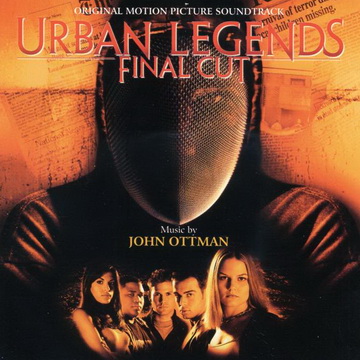 On Urban Legends: Final Cut, you not only composed for and edited the movie, but you were also directing. How did it feel like to juggle three tasks?
On Urban Legends: Final Cut, you not only composed for and edited the movie, but you were also directing. How did it feel like to juggle three tasks?Insanity. I wouldn't attempt all three jobs again. It did, however, teach me how to be even more objective in the separate tasks. I really trained myself to alienate myself from my other tasks on the film. For instance, when in the final sound mix I treat the music as just another element, and I often find myself lowering it more than raising it. There can be no agenda from any particular department in making a film. Everyone must have objectivity as to what is best for the film. I think when I walk into a dub, the mixers trust I'm not there with a musical agenda.
Is there a lot of fighting between the studio and the director because of the music? In a case like this how much does the composer's opinion count?
Well it often depends on the relationships involved. If it's a powerful director like Bryan, there is far less interference from the studio. So ironically the bigger Bryan gets, the more independent we're able to be like in the old days. It's nice to answer to only one person rather than many cooks.
And since I have a long-standing relationship as a film-making partner, I think my opinion is listened to. I think I've been lucky to have the trust of execs and film-makers. It's all about not only having a point of view, but knowing how to express it diplomatically and effectively.
Apart from directing, editing and composing, have you been involved in any other way with any of your projects?
That's enough! I was an associate producer on Apt Pupil. But that was just a title given to me because I'm very involved with the projects I work on with Bryan.
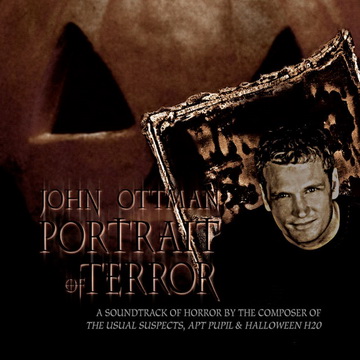 You had two well-documented rejections in your career (Cruel Intentions and H20). What were the "official reasons" they gave you and how did they inform you?
You had two well-documented rejections in your career (Cruel Intentions and H20). What were the "official reasons" they gave you and how did they inform you? Oh there's always so much to a story. I would refer to my website memoirs where I talk about this in a g-rated fashion. Basically for Cruel Intentions there were political reasons behind the scenes involving a record deal, producer agendas, distrust, etc. For H20 it was a case of non-communication between the film-making team and the producers. The director and editor approved of the entire original score's Hitchcockian approach and even went to all the sessions. It was a love-fest. But when the producers heard it, they wanted it just like the temp score, which was over-the-top cliché horror music. So about 1/4 of the score got replaced or moved around in crazy ways. The film had tested well with the temp score, and there was no time to retest with a new score. So they went with, in their minds, a sure thing. So we'll never know how the film would have felt with a slightly more character-driven approach. I always contend that the more the audience is with the characters the more scared they'll be when in jeopardy.
On the flipside of the coin, did you ever replace anybody on a project? If yes, what did you do differently that made you the ultimate choice?
Yeah a couple times. I was really honored to replace John Barry on Goodbye Lover. It was a suspense thriller with a very rye sense of humor infused throughout. He had scored it very straight and smoky, and the comedy was so subtle and dry, that people weren't sure whether they should be laughing or not. The score needed to have a little more wink in the eye, subtly letting the audience know that they could laugh. It was tough to ride that line in a sophisticated way. I think it's one of my best scores.
Because of a scheduling conflict, Chris Young had to leave Hide and Seek, so I took that over. He had already written a good theme, so it was a challenge and intimidating to walk in and try to outdo it.
Some of your scores had to be written in a very short time, we're thinking about projects like My Brother's Keeper, Gothika and Pumpkin... How is it possible to write so much music in so little time? Do you have any tricks when working for a strict deadline?
It's all about A) Having no life and B) Being psychotically organized. C) Eating while you work and D) Accepting that sleeping it isn't gonna happen E) I'm going to miss my favorite shows on TV. I plot out what has to be done per day on the calendar and simply know I must complete that much music that day no matter what. It's really a mind set more than anything.
 You've done recordings with many orchestras from union ones to small independent bands. What are your best and worst recording experiences?
You've done recordings with many orchestras from union ones to small independent bands. What are your best and worst recording experiences?When you record out of Los Angeles, it's a little more a crap shoot. But having said that, as long as you get the best musicians, you can get masterfully performed scores. You just have to have a good and honest contractor. One of my best recording experiences was Snow White in Seattle. It just went flawlessly from the first moment – great sound and great musicianship. So when I went back with the film, Incognito, I walked in the studio (actually a church where we record) with a huge amount of confidence. I didn't recognize a lot of the players, and we made a little joke that the string section looked like the local rest home had been let out. Sure enough, many musicians could not perform the score. This was heartbreaking and shocking. It was the only time I've demanded players be replaced for the next day. We lost an entire day as a result and really has to haul ass to get it done. It's really great though to stay in town and just drive down the street to record everyday rather than have to uproot and record out of town. Now that union fees are eased for soundtrack albums, it also makes it less attractive to leave town. Also you establish a relationship with the musicians in town – they become good collaborators and friends. So it's nice to keep going back to the same family to record.
How much say do you have in the final contents of your soundtracks? If yes, what are your guidelines?
I have 100% control over what goes on the album. The only guidelines are length. These are sometime painful choices, as in the case of Superman Returns, where I had to cut out an hour of music.
To get as many of the ideas in as possible, I had to spend a lot of time editing down the length of cues and cutting many others out completely. So when scores are critiqued soley based on the soundtrack album, it's kind of silly. There is so much missing, and it's really all about how well the music helps and defines the film itself. I also am a sticker on how the album is mastered (EQ and reverb.) I think I re-mastered the Superman album three times. I drove my engineers crazy.
On your website, you talked about releasing some of your earliest scores. How are those projects going?
Ugh. I wish I had more free time to devote to that hobby. It would a fun time to resurrect and have them performed. Maybe someday I can take a trip to Prague for fun and record one of these old scores for fun.
What do you think about temp trackings? Do you find them useful or distracting?
Temp music is good for showing the tone the director wants (if it's a temp that's done well.) So in that regard, they can be useful – as long as they are just seen as a general guide. It's when there's a dependency on the temp as gospel, new and fresh ideas are sometimes not explored. That's where the tactfulness and passion of a composer comes into play – to present other ideas and explain why they may be a better way to go. The worst situations are when a temp is clearly terrible and they love it. That's a frustrating experience to go down a road you know is not the best. In the end of the day you have to fulfill the wishes of the director and producers. But you also need to express why you feel it may be an error. I try to get on projects early enough so that "temp love" has not occurred yet. For many projects I start writing mock-ups before there is a temp. Fortunately too, many projects are temped badly, and they know it. So any new good idea you present is embraced.
You write lots of synth mock-ups that never end up in the movies. Have you thought about producing an album out of these or putting some of them on your site?
Well every single thing I write has had a detailed synth mock-up before it is re-performed by an orchestra. By comparison they sound terrible next to the real thing. It would be interesting to play the mock-up next to the real thing on an album or on the website, yes. I guess I could do that in my free time.
 You take part in lot of independent projects with smaller budgets. How do you tackle financial constraints?
You take part in lot of independent projects with smaller budgets. How do you tackle financial constraints?Well I have to plan how I write a little differently. I will roughly decide how many musicians can be afforded and then make decisions to cut out certain section of the orchestra and use synthesizer. Or I may plan a few cues that definitely need a big group and make other cues more synth-supported. This then allows me to record with less time but with more musicians.
I try not to let the financial constraints effect what is best for the film. But sometimes they do dictate the feel of the score – and ironically in positive ways. Pumpkin had no money at all, so I just used a little string section and some woodwinds, together with synth tracks. This gave the score a more intimate orchestra feel, which was perfect for the film. Sometimes too, it is interesting when writing to have certain restrictions and simply write for those restrictions as they did in the old TV era.
You've done some work composing commercials too. How did these projects find you?
It's all about connections. The House of Wax director does a lot of commercials, so he asked if I wanted to do his Wendy's spot. Bryan Singer did a Coke commercial, which I also edited, so I did that one. I love to do those when they come along, but it's rare.
Are there any scores you'd rewrite or approach differently now than when you wrote them?
That's a great question, but I'd have to say no, only because I put so much thought into what I do. I've been lucky not to have been forced into writing stuff I don't agree with. So when I'm done with a score, it's pretty much what I wanted to do. I would like to mix some of them louder though!
Your website is one of the most informative and updated composer sites out there. How do you feel about the internet – do you use it to read fan comments or reviews of your scores?
I thought a site would be a way for me to have a sort of photo/memoir album for posterity – to record my thoughts on projects and such. It's really there as a sort of g-rated diary and outlet for myself..
But oddly, I'm not an internet sort of guy. I really rather use the phone than type or read emails. Now people are texting on the phone. Don't we talk anymore!? So I really have never seen any chats regarding my work. I just figure I have to go on doing what I do and let the chips fall where they may. If you love it, I'm glad. If you don't, I'm disappointed, but I can't let it stop my instincts. I've had reviews forwarded to me on the internet, and have found some extremely insightful, even those which as negative. Then there are others which are tragically hilarious. It's funny the assumptions some reviewers make about the process of a film, when they are so off the mark. I remember a Gothika review in FSM going on and on about the supposed temp score and what my score was obviously inspired by. Funny thing is, the film had no temp at all. I wrote as they constructed the scenes. And the cues they referred to in the temp were from scores I had never heard before. So those kind of "reviews" are maddening and humorously pathetic at the same time.
Our highly respected Maestro Jerry Goldsmith passed away in 2004. How did this affect you? We know he is one of your idols.
It made me sad for a number of reasons. Not only is one the greatest film composers gone forever, but with him an era of film composing that has been withering on the vine is forever faded. He also was the one who inspired me the most. So it also felt personal to me. To the very end I think he always was trying to grow as had from his early days. I could go on forever about his scores, as we all can. His music is in all of us and therefore it's hard for any of us not to be affected by his passing.
To know more about John Ottman's work, please visit the composer's official website.
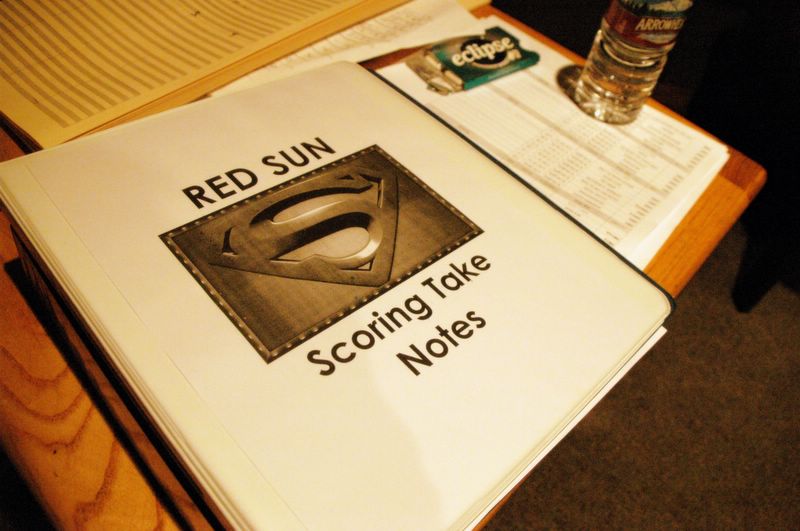

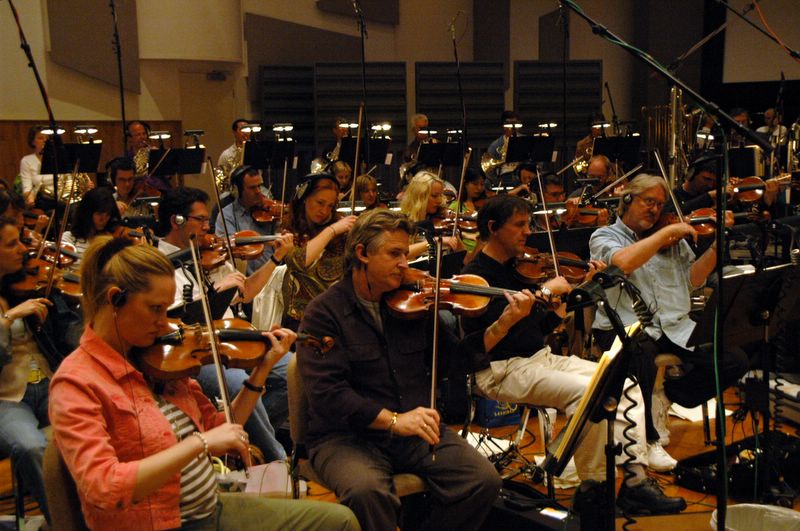
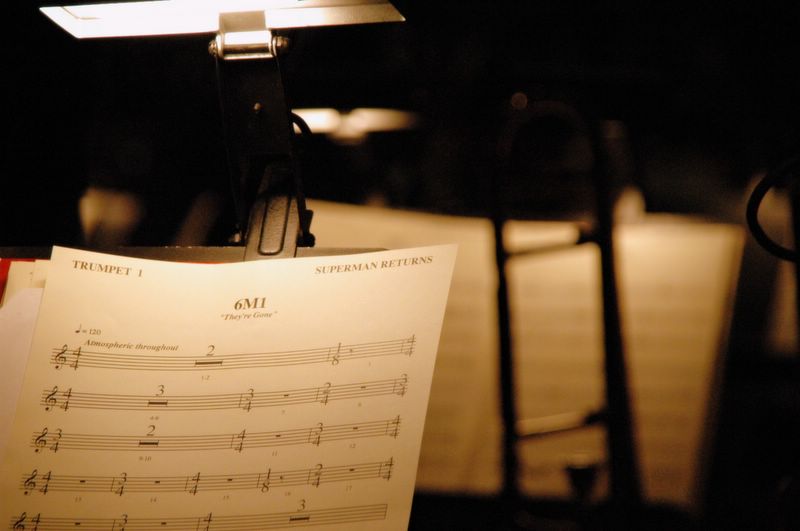
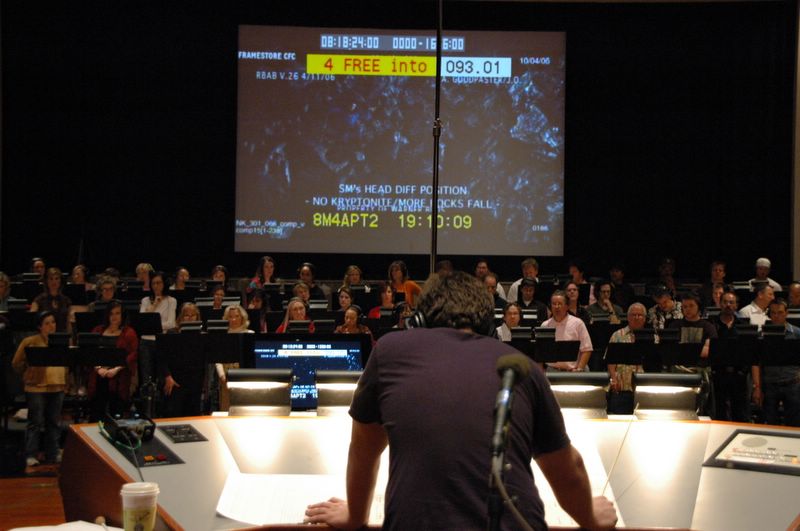
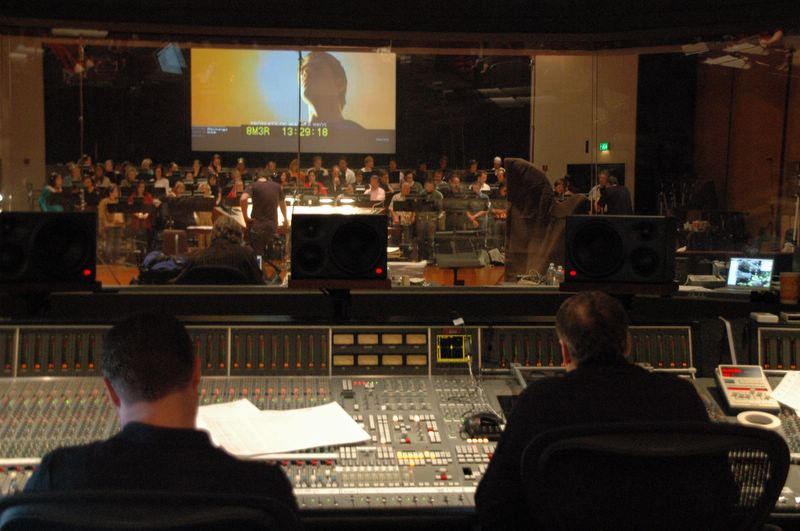
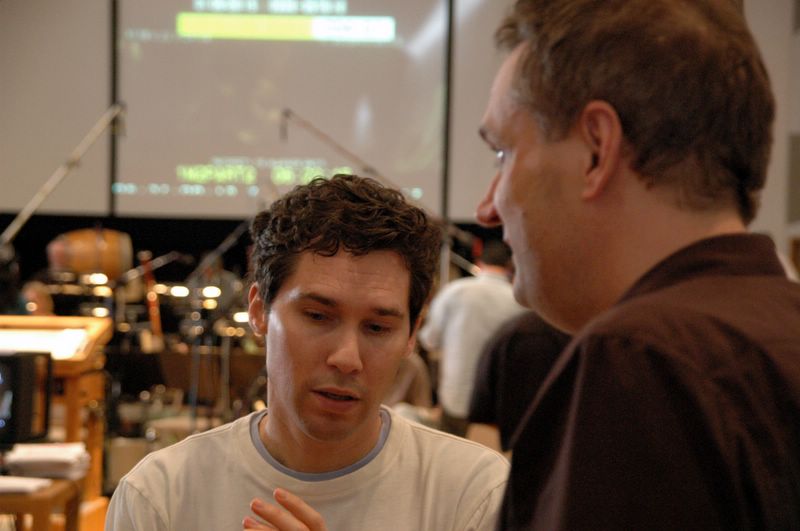

Photos from Dan Goldwasser, SoundtrackNet
June 10th, 2006
June 10th, 2006







